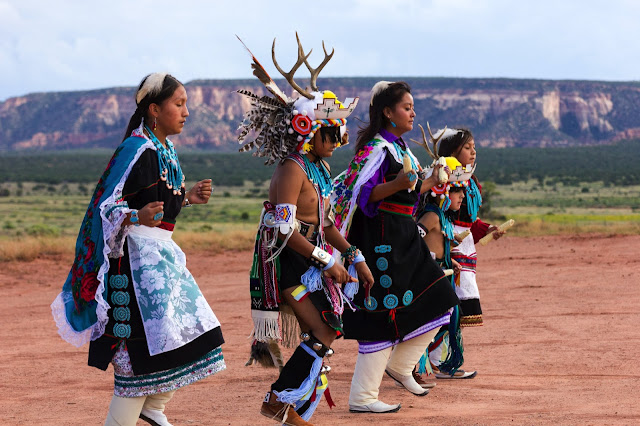New directions for Four Directions Community Center, in Sioux City
Published by Indian Country Today in 2010. For more on topics like this, see my book, American Apartheid: The Native American Struggle...
Already at the center of a web of activity that encompasses much of Woodbury County, Iowa, and the surrounding region, Four Directions Community Center is poised for even more growth. A new alliance with Siouxland Human Investment Partnerships, a 12-year-old area nonprofit, will develop Four Directions’ capabilities, said SHIP’s director, Jim France.
| LaMere and Senator Johanns, in South Sioux City. |
The center’s building near downtown Sioux City is already bustling with activity. As people arrive — for parenting classes, AA gatherings, Lakota language instruction, domestic violence education, meetings of the policy group Community Initiative for Native Children and Families, a University of Iowa college-awareness program for youth, regular meetings with state officials, community gatherings, including wakes and funerals, and much more — the first person they’re likely to encounter is administrative assistant Liz White, Sisseton Wahpeton Oyate, who presides over the comings and goings with a grandma’s affability and authority.
White also heads up the organization’s volunteer effort, which results in hundreds of hours of work donated monthly, and directs countless daily phone calls from community members seeking help and information to the organization’s executive director, Frank LaMere, Winnebago, and program manager, Judy Yellowbank, Winnebago.
Four Directions’ major annual event is the Memorial March to Honor Our Lost Children, held each year on the day before Thanksgiving. Walkers proceed from South Sioux City, Nebraska, across a bridge over the Missouri River to Sioux City, Iowa, calling attention to Native children caught in the child-welfare system, including several who died while placed with foster or adoptive families.
The relationship with SHIP will make possible more work on behalf of Four Directions’ constituency. SHIP offers its partners — which focus on child welfare, health, education, job training, juvenile justice and more — access to nonprofit status and infrastructure, according to France. “We already have our 501(c)3, and we have grant-writing and administrative capacity, so groups we work with needn’t hire lawyers and other professionals to set this up themselves.” When a group would benefit from networking with another agency, SHIP can make that happen, said France.
LaMere agreed. “Working with SHIP means we’ll have increased ability to take care of our own. It’s high time.”
Recent events at Four Directions included a two-day meeting of the Iowa Commission on Native American Affairs, a group of gubernatorial appointees that includes Yellowbank. The subject of the first day was child welfare and featured a training session by ICWA (Indian Child Welfare Act) specialist Allison Lasley, Meskwaki, who explained ICWA provisions for commissioners and invited guests, including Iowa human rights director Preston Daniels, a representative of the governor’s office, and members of the Native American Unit of the state’s department of human services.
On the second day, the commission took up several issues, including a report on work in Iowa’s men’s and women’s prisons by Judy Morrison, Cherokee/Osage, Native American spiritual and cultural consultant for the department of corrections. Morrison called for more support after release. “I want there to be services for our people, including money for education and job training.”
LaMere added: “You can’t simply send them back to the situations that got them off track to begin with.”
After the two-day meeting concluded, LaMere and Yellowbank facilitated the presentation of the award-winning documentary, “The Battle for Whiteclay,” directed by Mark Vasina, in the sanctuary of St. Augustine Indian Mission, in Winnebago, Nebraska. Vasina and LaMere, who appears prominently in the film, spoke following the showing. The movie looks at the fight to control the flood of liquor and despair from beer stores in the Nebraska town of Whiteclay to the neighboring dry Pine Ridge Indian Reservation, which straddles South Dakota and Nebraska.
The film also examines Nebraska officials’ resistance to ameliorating what has been called a human-rights crisis. Some claim the stores, which are licensed by the state, are legal businesses and therefore cannot be shut down. Another refrain, heard in the film and reported in Indian Country Today (Nebraska governor’s office on Whiteclay: No easy solution; August 18, 2010; vol. 30, no. 11), is that the problem is just too complex to resolve.
LaMere, who is involved in local, state and national politics in addition to his activism and his community work, reported he has set up a meeting with Senator Mike Johanns (R. – Neb.) to discuss Whiteclay. LaMere said the meeting was a breakthrough. “We may not come to conclusions, but we’ll put ideas on the table and see where they take us. That’s a very positive step.”
Going forward, Four Directions seeks “to elevate the discussion,” said LaMere. “Our elders have told us to do this. Our people have marched to accomplish this. We’re building bridges and fostering understanding.”
Text and photograph c. Stephanie Woodard.
Text and photograph c. Stephanie Woodard.

